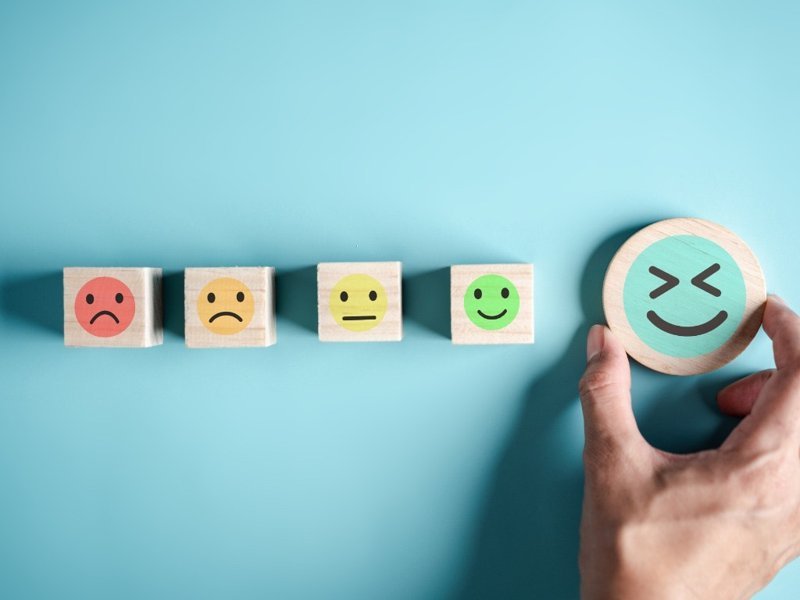What if the secret to a balanced life isn’t working harder? But caring for your mind in small, steady ways each day?
You juggle deadlines, meetings, and nonstop pings. It’s easy to ignore how you feel until stress starts to run the show. Maintaining Mental Health is about your emotional well-being, your self-view, and how you handle pressure. One in five Americans faces a mental illness in a given year, yet simple mental health tips can help you stay steady, focused, and energized.
This guide shows how short breaks, boundaries with technology, movement, mindfulness, and supportive nutrition fit a busy schedule. You’ll see how face-to-face connection, planning ahead, and seeking help when needed lower stress and prevent burnout. Tools like Calm and Headspace can coach you through quick practices that build resilience and improve job performance and relationships.
Across the next sections, you’ll get five clear focus areas—social connection, movement, mindfulness, rest, and nutrition/self-care—so you can protect your emotional well-being without blowing up your calendar. Small steps today add up to long-term strength and a more balanced life.

Why Your Mental Health Matters for Balance and Productivity
Your mind sets the tone for your day. Feeling clear and calm helps you make better choices. It also lets you respond patiently and conserve your energy. This is key to being productive and balanced.
Busy weeks can be overwhelming with long hours and tight deadlines. Without managing stress, your body gets stressed too. This can lead to a faster heart rate and shallow sleep.
Thoughtful breaks and healthy boundaries help prevent burnout. They act as daily shields against exhaustion. This keeps you focused and in a good mood.
Studies from the American Psychological Association show the benefits of basic practices. Mindfulness, regular exercise, and enough sleep improve focus and reduce headaches. These habits also boost creativity and patience, leading to better productivity and balance.
Watch out for signs of burnout like constant tiredness and trouble focusing. If these signs last, consider therapy. It can fit into your busy schedule and provide tools for managing stress.
Start with small steps: a brisk walk, a mindful pause, or setting clear boundaries. Taking care of your mind today helps with important relationships, ideas, and decisions.
Maintaining Mental Health
You can protect your mind with small shifts that fit your day. Think short breaks, clear boundaries, and routines that lower noise. These daily habits help you stay on track without adding stress.
Daily mental health habits that fit a busy life
Use micro-pauses. Step away from your desk for two minutes, breathe, and stretch. A brief walk around the block can reset focus and cut overwhelm.
Silence non-urgent work alerts after hours. You protect recovery time and guard attention for what matters most the next day.
Follow movement cues. Start with a brisk walk or bike ride. A 6-week study in university students showed that aerobic exercise twice a week reduced perceived stress. The CDC suggests 150 minutes of moderate activity weekly plus two days of strength, but you can build up gradually.
How to stay mentally healthy with realistic routines
Plan your week on one page. Block work, meals, and a short “me time” session. Keep it simple so you stick with it.
Set boundaries and communicate needs. Tell coworkers when you are heads-down. Say no when your plate is full. This is how to stay mentally healthy when demands spike.
Hold space for your feelings without self-criticism. Try a quick journal entry at night, read a chapter, or take a warm bath. These small acts support improving emotional well-being and keep your routine flexible.
Stress management foundations for emotional well-being
Use mindful breathing you can do anywhere. Try diaphragmatic breathing, box breathing, or alternate nostril breathing. Even three minutes can calm your nervous system and support stress management.
Practice yoga or gentle stretching to ease tension and steady your mood. A short flow before bed signals your body to wind down and helps with sleep.
Aim for clear priorities. Write a focused to-do list with realistic deadlines. Avoid procrastination to lower stress and free up time for improving emotional well-being.

Social Connection and Support for Anxiety Relief
You feel better when you belong. Real-time presence, steady eye contact, and shared laughs offer fast anxiety relief that scrolling cannot match. Use simple mental health tips to lean on social support and set communication boundaries that protect your energy.
Prioritizing face-to-face connection to boost mood
Choose time with people who leave you calm and energized. Short coffee chats, a walk in the park, or cooking together can ease stress in minutes. Positive touch, like a hug, may help lower cortisol and steady your heart rate.
If big events drain you, pick smaller meetups. Step back from social media when comparisons spike. These mental health tips help you stay grounded and keep anxiety relief within reach.
Setting boundaries and communicating your needs
Clear communication boundaries guard your well-being. Say no without apology. Ask friends not to drop by unannounced. Take a rain check when your plate is full.
Protect off-hours by silencing alerts after work. Tell coworkers when you are reachable. These small moves build social support while leaving room for recovery.
When to talk to someone and seek professional support
Open up when worries feel heavy. Sharing with a trusted person can calm your nervous system and widen your view. Keep a short list of contacts you can text or call.
If symptoms persist, consider therapy for tailored mental health tips, including cognitive-behavioral and mindfulness-based tools that fit a busy day. In urgent moments, use crisis lines. For ongoing care, organizations such as the Canadian Mental Health Association and Here to Help provide guidance; in the United States, seek local crisis resources and licensed professionals.
| Goal | Action | Why It Helps | When to Use | Boost Mood Fast |
|---|---|---|---|---|
| Schedule a 20-minute walk with a friend | Face-to-face social support lowers perceived stress | Midday slump or after a tough meeting | ||
| Protect Energy | ||||
| Set communication boundaries for after-hours | Reduces nonstop alerts and preserves recovery time | Evenings and weekends | ||
| Ease Physical Tension | ||||
| Use a hug or grounding touch with consent | May release oxytocin and lower cortisol | Before bed or after conflict | ||
| Get Perspective | ||||
| Share concerns with a trusted person | Co-regulation calms the nervous system | When racing thoughts build | ||
| Structured Support | ||||
| Start therapy for targeted mental health tips | Personalized strategies for anxiety relief | When symptoms persist or disrupt routine |
Movement, Mindfulness, and Rest: Core Stress Management Practices
You can make your day calmer with small choices. Try short exercises, a few minutes of mindfulness, and a good sleep routine. These habits help keep your mood steady and improve focus.
Stay active: short walks, stretching, and exercise guidelines
Exercise is good for your brain and body. The CDC suggests 150 minutes of moderate exercise a week and two strength days. If that’s too much, start with 10-minute walks or short breaks.
Even busy weeks, keep moving. Try walks, bike rides, or active commutes. These activities reduce stress, improve sleep, and make managing stress easier.
Mindfulness and deep breathing for daily calm
Short mindfulness sessions can help. Two to five minutes can lower anxiety and improve your mood. Use apps like Calm and Headspace for guided sessions during breaks.
Try breathing exercises anywhere. Diaphragmatic, box, or alternate nostril breathing can relax you. Slow, deep breaths help your nervous system relax and support your mental health.
Don’t skimp on sleep: screen limits and wind-down rituals
Keep a consistent sleep schedule. Stick to the same bed and wake times. Give yourself a wind-down period before bed.
Dim lights, stretch, or read to calm your mind. Avoid screens before bed to help you sleep better. Better sleep boosts stress management and keeps your emotions stable.
| Practice | Simple Start | Brain Benefits | When to Do It |
|---|---|---|---|
| Movement | 10-minute walk + 5 minutes of stretching | Lower stress, better memory, improved mood | Morning or mid-afternoon |
| Mindfulness | 3–5 minute guided session (Calm or Headspace) | Less anxiety, sharper focus, emotional balance | Before meetings or after lunch |
| Breathing | Box breathing: 4-4-4-4 pattern for 2 minutes | Slower heart rate, calmer nervous system | Any time stress spikes |
| Sleep | Consistent bedtime + 30-minute wind-down | Resilience, clearer thinking, steady mood | Nightly, same time |

Nutrition and Self-Care Habits That Improve Emotional Well-Being
Stabilizing your mood is easier with a balanced diet and simple self-care. Small choices can make a big difference. Focus on foods that boost your brain and stress-reducing routines.
Balanced, brain-healthy eating to stabilize mood
Eat more vegetables, fruits, beans, fish, nuts, and seeds. This diet supports your emotional health and keeps your energy steady. Avoid foods that are highly processed and high in sugar to prevent mood swings.
Choose foods backed by science: salmon or sardines for omega-3s, lentils and black beans for fiber, and walnuts and almonds for healthy fats. Avocados are great for feeling full, and dark leafy greens like spinach and kale are packed with nutrients. For a sweet treat, try blueberries and a small piece of dark chocolate.
When you’re busy or celebrating, start meals with vegetables and protein. Have a light, healthy snack before events, and choose festive drinks without alcohol. For personalized advice, talk to a registered dietitian to improve your diet and mental health habits.
Simple self-care: journaling, nature time, and reducing screen time
Make self-care easy so you actually do it. Try a five-minute journal, a short walk, and some light stretching before bed. Use calming scents or a candle to signal it’s time to relax.
Just 10 minutes in a park or garden can boost your mood and reduce stress. Cutting down on phone use improves your sleep and focus, helping your emotional well-being without big changes.
Smart caffeine use and considering supplements safely
Limit caffeine to under 400 mg a day—about four to five small cups of coffee—to protect your sleep and mood. If you feel jittery, try matcha or a chai drink for a milder energy boost.
Magnesium helps with stress and might be low when you’re under a lot of pressure. If you’re thinking about supplements, talk to your doctor first. They can help you choose the right one and the right amount, ensuring it fits with your self-care and mental health habits.
| Choice | Why It Helps | How to Apply Today |
|---|---|---|
| Omega-3 fish (salmon, sardines) | Supports brain function and mood stability | Add a 3–4 oz serving to lunch with leafy greens |
| Legumes and greens | Fiber balances energy; folate supports nerves | Mix lentils with spinach, olive oil, and lemon |
| Walnuts, almonds, and seeds | Healthy fats sustain focus and satiety | Carry a small handful for a midafternoon snack |
| Blueberries and dark chocolate | Polyphenols combat oxidative stress | Pair a cup of berries with a small dark chocolate square |
| Screen-time trims | Improves sleep and attention | Set a 30-minute phone curfew before bed |
| Nature micro-breaks | Lowers tension and heart rate | Plan a 10-minute walk in a nearby green space |
| Caffeine limits | Reduces jitters and sleep disruption | Keep below 400 mg; swap one coffee for matcha |
| Magnesium check-in | Supports the stress response | Discuss options with your clinician before use |
Conclusion
Maintaining Mental Health is achievable with small, consistent steps. Spend quality time with people, take short mindfulness breaks, and set tech limits. Regular exercise, deep breathing, and good sleep are also key.
Whole foods boost focus and mood. Journaling, spending time in nature, and less screen time help reduce anxiety. These habits lead to lower stress, a steady heart rate, and better sleep.
They make you sharper at work and more present at home. Social support, setting boundaries, and smart caffeine use help too. If you need help, therapy and community resources offer tailored advice.
Start with what you can do daily, like a lunchtime walk or deep breathing before meetings. A bedtime routine and healthy meals also help. Over time, these habits improve your emotional well-being and mood.
Small, daily actions build lasting resilience for your work and life.
FAQ
What does “maintaining mental health” actually mean for your daily life?
It means taking care of your mind and how you feel. It’s about how you connect with others and handle stress. Daily habits like short breaks, exercise, and mindfulness help a lot.These habits build resilience and improve your mood. They support your long-term happiness.
How can I stay mentally healthy when my schedule is packed?
Use small habits. Take short breaks between tasks and protect time at night. Set limits on your apps after work.Batch tasks and plan meals. Block time for focus. These simple steps reduce stress and keep you energized.
What are the best daily mental health habits for busy professionals?
Try short walks and desk stretches. Box breathing and 5–10 minute meditations help too. Use apps like Calm or Headspace.Make time for people you care about. Set tech limits after work. Keep a gratitude journal. These habits reduce anxiety and improve focus.
How do I build a realistic routine for stress management without burning out?
Start small and specific. Choose one habit for each area, like socializing or exercise. Anchor each habit to a routine, like breathing before emails.Gradually add more habits. Use weekly check-ins to adjust your goals, not your standards.
What are the foundations of stress management and anxiety relief?
Focus on mindfulness and breathing. Regular exercise and sleep are key. Set tech boundaries too.Add healthy foods to your diet. These steps lower stress hormones and improve your mood.
Why does social connection matter more than endless scrolling?
Face-to-face interactions calm your mind and boost your mood. They help regulate stress hormones. Choose time with people who make you feel good.Smaller gatherings are better if big groups drain you.
How do I set boundaries with technology without hurting my career?
Communicate clear expectations. Note your response hours in your email signature. Use “Do Not Disturb” after work.Offer alternatives like calendar links. This way, you stay responsive while protecting your time.
When should you talk to someone or seek professional help?
Reach out if you feel exhausted, detached, or irritable. If you can’t focus or sleep well for two weeks, seek help.Therapy offers strategies for busy lives. If in crisis, call local crisis lines or emergency services.
How much exercise do you need for mental health benefits?
Aim for 150 minutes of moderate activity weekly. Include two strength training days. Start small and build up.Even two aerobic sessions a week can improve your mood and energy.
What mindfulness or breathing techniques work fast during stressful days?
Try box breathing or 5–10 minute meditations on Calm or Headspace. Diaphragmatic breathing helps too. Alternate nostril breathing steadies your heart rate.These quick tools help you focus before big tasks.
How can you improve sleep when your mind won’t shut off?
Keep a regular sleep schedule. Dim lights before bed and avoid screens. Try a wind-down ritual like stretching or reading.If your mind races, write down your thoughts for 2 minutes. This clears your mind.
What should a brain-healthy eating pattern look like?
Eat whole foods like vegetables, fruits, and whole grains. Include nuts, seeds, and fatty fish. Dark leafy greens and berries are good too.Dark chocolate is okay in moderation. Avoid ultra-processed foods and added sugars to stabilize your mood.
What are simple self-care ideas that actually help?
Start with small steps like a 10-minute walk or a short journal entry. Stretching before bed helps too. Time in nature improves well-being.Reducing screen time also eases stress and supports better sleep.
How should you manage caffeine for better mental health?
Limit caffeine to 400 mg daily—about 4–5 cups of coffee. Avoid it before bed. If sensitive, try half-caf or matcha.Pair caffeine with food to prevent jitters and mood dips.
Are supplements like magnesium useful for stress?
Magnesium supports your stress response. It may help with chronic stress. But talk to your doctor before starting any supplements.
How do you avoid procrastination that fuels stress?
Use a to-do list and time-block your tasks. Set realistic deadlines. Try the “two-minute rule” for quick wins.The Pomodoro Technique helps you stay focused. Small wins reduce anxiety and improve sleep.
What’s the fastest way to reset during a hectic workday?
Take a five-minute walk away from screens. Do one minute of box breathing. Hydrate too.This mini-reset lowers stress and improves focus.
Which apps can help you build daily mental health habits?
Calm and Headspace offer short meditations and breathing exercises. Use phone focus modes or app timers to limit work notifications.This helps you recover and stay focused.
How do you keep momentum when motivation fades?
Make habits easy and visible. Lay out walking shoes or schedule social time. Keep a journal on your desk.Track streaks and celebrate small wins. Pair habits with routines. Consistency is key for emotional well-being.






